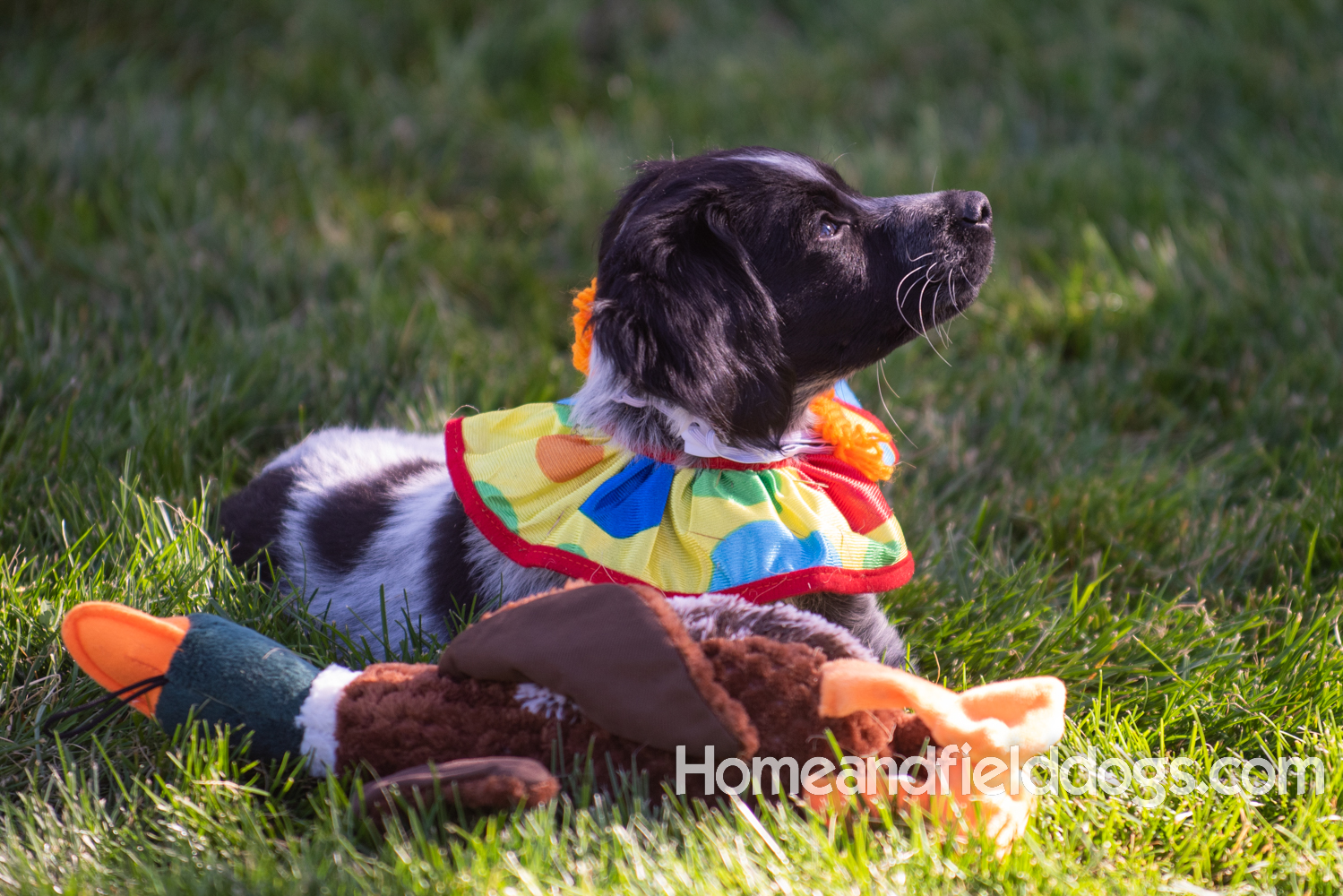Some frequently asked questions we get about this wonderful breed the Epagneul Breton or French Brittany.
How do I choose a French Brittany Puppy?
Are you considering adding a furry companion to your household? Look no further than the French Brittany. These loyal and energetic pups make the perfect addition to any home. But how do you choose the right one for you?
First, consider your lifestyle and needs. Are you an active person who loves outdoor adventures? Or do you prefer cozy nights in with a book? French Brittanys are known for their high energy levels and love for exercise, so if you’re an active person, they may be the perfect match for you. On the other hand, if you’re more of a homebody, a French Brittany may still be a great choice with appropriate training and exercise.
Next, consider the breeder. It’s important to find a reputable and responsible breeder who like us raises their puppies in a clean and healthy environment. Look for a breeder who allows you to meet the parents and who can provide documentation of health clearances and genetic testing.
When you do find a litter that interests you, take the time to observe the puppies’ behavior. Do they seem playful and curious? Are they comfortable around people? It’s essential to find a puppy with a good temperament that will adjust well to your family’s lifestyle.
Are you looking for a Pet? A service dog candidate? A hunting companion? Being clear on the goals you have with your French Brittany will help us pair you with the right puppy for your needs.
Finally, don’t be afraid to ask the breeder questions. A reputable breeder will be happy to provide you with information about the breed, the individual puppies, and their care and upbringing. They may even offer some tips for training and socializing your new furry friend.
Now that you’ve chosen your perfect French Brittany puppy, remember to give them the love and attention they deserve. With the right care and training, your new furry friend will bring joy to your life for many years to come.
What are the benefits of owning a French Brittany Puppy?
If you’re on the fence about adding a French Brittany puppy to your household, let me assure you that these fluffy little pups come with a whole host of benefits.
First and foremost, French Brittanys are incredibly loyal to their owners and make amazing companions. Whether you’re going on long hikes or relaxing with a book, your French Brittany will be right by your side, providing love and support.
But that’s not all! These pups are also incredibly intelligent and easy to train. With their strong desire to please their owners, they quickly learn and respond well to commands. And with their high energy levels, they make great candidates for agility training, hunting, and other canine sports.
Speaking of energy levels, French Brittanys are highly active dogs, which can be a great motivator for their owners to get outside and get moving. Whether you’re taking your pup on long walks or playing fetch at the park, getting exercise with your furry friend can help boost your own fitness levels and overall health.
Plus, who doesn’t love coming home to a wagging tail and happy face at the end of a long day? French Brittanys have a way of brightening up even the gloomiest of days with their boundless enthusiasm and affection.
Finally, owning a French Brittany can be a source of pride and joy. You’ll likely receive plenty of compliments and questions about your furry friend, and you’ll have the satisfaction of knowing that you’re giving your pup a loving and fulfilling life. Dog ownership is proven to lower blood pressure and add years to your life. I have personally taken my blood pressure and then repeated it as I am petting a puppy and seen a difference of 40 points! Also petting a dog or puppy is proven to release mood enhancing hormones in your body. It is good for body and soul to have these cute pups around
How do I care for my French Brittany Puppy?
Congratulations on your new French Brittany puppy! Taking care of a new furry family member can be overwhelming, but with proper care, your French Brittany will thrive.
First and foremost, ensure that your puppy is up-to-date on their vaccinations and schedule regular check-ups with your veterinarian. French Brittanys are generally healthy dogs, but like all pets, they require proper care and attention to maintain their health and wellbeing. Also pay close attention to their nutrition. In todays market everyone is competing for your pet food dollars and cutting corners to do it. Click here to learn more about their optimum nutrition.
When it comes to feeding your puppy, choose a high-quality puppy food that is appropriate for their age and size. Be sure to read the labels and follow feeding instructions carefully. Avoid overfeeding or giving your pup table scraps, as this can lead to obesity and other health issues.
French Brittanys are high-energy dogs, and daily exercise is essential for their physical and mental health. Take your pup for regular walks and playtime in the park, and engage in activities that allow them to use their natural instincts, such as hunting and retrieving games.
What are the personality traits of a French Brittany Puppy?
Why French Brittany’s or Epagneul Breton? In the about us link you will learn more, but simply put they are little packages of bird finding dynamite in wonderful colors that only want to please. They are the breed that helped me truly understand the word ‘biddable.’ They want to be your best friend and be on your couch and in your home and work for you in the field. Many pointing breeds are independent and hunt for themselves. A Brittany is not going to hunt for you or at all if it doesn’t love you. And they will love you. They are in it for the partnership, and they are impossible not to love. Small enough to get into the dense cover and work it, fast enough to run down winged birds and bring them back. They are a great conservation tool. But all that enthusiasm they have and show in the field? They are great little house companions that don’t bounce off the walls. And while American Brittany’s are wonderful in their own right, their French counterparts are slightly smaller, have more color varieties, Seem to range a little closer and tighter which is more suited to my age and style of hunting. I just don’t want a dog out of shotgun range anymore I am too broken down and too slow. French Britts have excellent hunt drive, natural genetics for confidence, solid points, and great retrieves. Even great in the water. Agile dogs sized for working dense cover and quartering well.
How do I potty train my French Brittany Puppy?
Here is a great Article on housetraining
Potty training your French Brittany puppy may seem daunting, but with consistency, patience, and positive reinforcement, your pup will quickly learn the ropes. Here’s a step-by-step guide to help you potty train your new furry friend:
- Establish a routine: Consistency is key when it comes to potty training. Set a schedule for feeding, playtime, and potty breaks, and stick to it as closely as possible. This will help your puppy understand when it’s time to go outside.
- Take them out frequently: Puppies have small bladders and need to go potty more often than adult dogs. Take your French Brittany outside every 1-2 hours, as well as after waking up, eating, and playing. Be sure to take them to the same spot each time to reinforce the association between that location and going potty.
- Use a cue word: Choose a phrase or word, such as “go potty” or “outside,” and say it consistently when you take your puppy outside to do their business. This will help them associate the word with the action of going potty.
- Praise and reward: When your puppy successfully goes potty outside, shower them with praise and offer a small treat or toy as a reward. This positive reinforcement will encourage them to repeat the behavior in the future.
- Supervise and restrict access: Keep an eye on your French Brittany while they’re indoors, and look for signs that they need to go potty, such as sniffing, circling, or whining. If you notice these behaviors, take them outside immediately. You can also use baby gates or a playpen to limit their access to areas of your home until they’re fully potty trained.
- Accidents happen: It’s important to remember that accidents are a normal part of the potty training process. If you catch your puppy in the act, calmly interrupt them and take them outside to finish. Avoid scolding or punishing them, as this can create fear and confusion.
- Clean up accidents thoroughly: Use an enzymatic cleaner to remove any lingering odors from accidents. This will help prevent your puppy from being attracted to the same spot for future potty breaks.
- Be patient: Potty training takes time, and every puppy is different. It may take a few weeks or even months for your French Brittany to be fully potty trained. Stay consistent and patient, and remember that progress may not always be linear.
By following these steps and maintaining a positive attitude, you’ll set your French Brittany puppy up for potty training success. Good luck, and enjoy the journey with your new furry friend!
What is the average lifespan of a French Brittany Puppy?
The average lifespan of a French Brittany dog is approximately 12 to 15 years. This breed is generally known for its good health and longevity, thanks in part to responsible breeding practices and a relatively low incidence of genetic health issues.
However, individual lifespans can vary due to factors such as genetics, diet, exercise, and overall care. To help your French Brittany live a long and healthy life, be sure to provide proper nutrition, regular exercise, routine veterinary care, and plenty of love and attention. By taking good care of your furry friend, you can maximize their chances of living a happy and healthy life well into their golden years.
What are the exercise needs of a French Brittany Puppy?
French Brittany puppies are energetic and active, requiring regular exercise to maintain their physical and mental health. As a general guideline, your French Brittany puppy should receive at least one hour of daily exercise, but this can vary depending on your pup’s age, energy level, and individual needs.
Here are some exercise ideas for your French Brittany puppy:
- Walks: Take your puppy on several short walks throughout the day. As they grow older and stronger, you can gradually increase the length and intensity of the walks.
- Playtime: Engage your puppy in games like fetch, tug-of-war, or frisbee. These activities not only provide physical exercise but also help with mental stimulation and bonding.
- Off-leash play: If possible, find a safe, enclosed area where your French Brittany can run and play off-leash. This allows them to expend energy and practice their natural hunting and retrieving instincts.
- Socialization: Puppy playdates or visits to the dog park can be a great way for your French Brittany to socialize with other dogs while also getting some exercise. Ensure your puppy is up-to-date on vaccinations and well-socialized before introducing them to new environments or other dogs.
- Training: Participate in obedience training or dog sports like agility, flyball, or scent work. These activities provide both physical exercise and mental stimulation, keeping your French Brittany engaged and happy.
- Mental stimulation: Puzzle toys, treat-dispensing toys, and interactive games can help keep your French Brittany mentally stimulated, which is just as important as physical exercise.
Remember that puppies have growth plates that are still developing, so it’s crucial not to over-exert them or engage in high-impact activities until they’re fully grown. Always monitor your puppy for signs of fatigue or overheating and adjust the exercise routine as needed. Consult with your veterinarian for guidance on appropriate exercise levels based on your puppy’s age, size, and overall health.
What are the feeding needs of a French Brittany Puppy?
We recommend only Life’s abundance food for your new family member. It has never had a recall or a lawsuit. Our kennel was once sponsored by Proplan and received a pallet of food every month for free. We switched to Life’s Abundance because of some issues and bought our own food ever since and it was the best decision we ever made. Click here to learn more or order your food.
What are the grooming needs of a French Brittany Puppy?
French Brittany puppies have a low-maintenance coat that requires minimal grooming. However, regular brushing and grooming can help keep their coat healthy and shiny, minimize shedding, and bond with your furry friend. Here are some tips to help you keep your French Brittany puppy looking and feeling their best:
- Brushing: Brush your puppy’s coat once or twice a week using a soft-bristled brush or a grooming mitt. This helps remove loose fur, dirt, and debris, and distributes natural oils throughout the coat.
- Bathing: French Brittanys typically do not require frequent baths, unless they get particularly dirty or smelly. Use life’s abundance shampoo and rinse thoroughly, taking care to avoid getting water in their ears or eyes. It makes them smell great! For in between baths we recommend this great smelling spray
- Nail trimming: Trim your puppy’s nails every four to six weeks, using either nail clippers or a nail grinder. Be sure to avoid cutting the quick, which is the pink part of the nail that contains blood vessels and nerves. Be very careful with a dremel not to catch the hair on the toes and feet. A quick trick is stuff their foot through some old panty hose and pop the nails through. This exposes the nails and protects the hair for either trimming method.
- Ear cleaning: French Brittanys have drop ears, which means they are prone to ear infections. Clean your puppy’s ears weekly to prevent buildup of dirt, debris, and excess wax. Use a gentle ear cleaning solution and cotton balls or gauze to wipe the ear clean, taking care not to go too deep.
- Teeth cleaning: Good dental hygiene is important for your puppy’s overall health. Brush their teeth using a dog-specific toothpaste, either with a toothbrush or a finger brush, a few times a week.
Regular grooming not only keeps your French Brittany looking and feeling great, but it also provides an excellent opportunity for bonding and socialization with your furry friend. And don’t forget to give plenty of praise and treats to reward them for their good behavior during grooming sessions.
How do I socialize my French Brittany Puppy?
Here is a great article on socialization
Here is an article on puppy development as well
Socializing your French Brittany puppy is one of the most important things you can do for their overall development and happiness. By exposing your puppy to a variety of people, animals, and experiences, you can help them become a well-adjusted and confident adult dog.
What is socialization? Socialization is the process of introducing your puppy to new experiences, sights, and sounds to help them learn how to interact with the world around them, while building their confidence and reducing anxiety. Socialization is critical during the first few months of a puppy’s life, as this is when their brains are most receptive to learning.
Why is socialization important? Socialization is essential to help your puppy develop important skills that will enable them to interact with people, animals, and different environments. It also helps build a strong bond of trust and loyalty between you and your puppy.
Here is a comprehensive guide on how to socialize your French Brittany puppy.
Step 1 – Start Early: The ideal time to begin socialization is during the critical socialization period, which usually lasts from three to twelve weeks of age. During this period, puppies are more accepting of new experiences, sounds, and sights. Therefore, expose your puppy to different sights, sounds, and experiences to build their confidence and reduce anxiety.
Step 2 – Introduce Your Puppy to New People: Introduce your French Brittany puppy to different kinds of people, including children, adults, and seniors. Let them observe people from a safe distance and get comfortable with different types of humans. However, ensure that you do not overwhelm your puppy; instead, allow your puppy to learn and interact with various people in a controlled, safe environment.
Step 3 – Introduce Your Puppy to Other Animals: Allow your puppy to interact with other animals, such as cats, dogs, and other pets. Ensure that the interactions are brief and positive, and supervise closely. Introduce your puppy to a fully vaccinated, well-trained adult dog that you know will not be aggressive towards the puppy. This will help your puppy learn to recognize and respond to other dogs’ communication signals.
Step 4 – Use Positive Reinforcement: Use positive reinforcement, such as treats, play, or praise, to make socialization fun and enjoyable for your puppy. Use rewards to show appreciation for good behavior, such as being friendly and calm around new people and animals. Create a sense of security by rewarding your puppy for facing fears and experiencing new things.
Step 5 – Gradually Increase Exposure: Gradually increase exposure to new people, animals, and environments as your puppy gains confidence and matures. Continue to practice positive reinforcement and praise your puppy for their good behavior to cement good socialization habits.
Tips on Building Confidence in Your Puppy:
- Socialize your puppy in a controlled environment where they feel safe and secure.
- Introduce them to new things slowly and gradually.
- Use positive reinforcement to reward them for good behavior.
- Praise and reassure them when they get nervous.
Activities to Help with Socialization:
- Allow your puppy to play in a dog park or area designed for dogs.
- Set aside time to train your puppy. Take them to obedience classes or teach them basic commands.
- Play with your puppy using toys to help them engage with humans and build confidence in themselves.
- Take your puppy on walks in different environments.
Socialization is a marathon, not a sprint, and it takes patience, consistency, and positivity to raise a well-socialized dog. Remember to involve your veterinarian and seek professional advice if your puppy continually displays antisocial behavior.
Start socializing your puppy today and experience the joys that they bring to your life!
What are common health concerns for French Brittany Puppies?
French Brittany puppies are typically a healthy breed, but, like all dogs, they can be susceptible to certain health issues. As a responsible owner, it’s important to be aware of these potential concerns and take preventative measures to keep your furry friend healthy and happy.
Here are some common health concerns to watch out for in French Brittany puppies:
- Hip Dysplasia: This is a genetic condition where the hip joint doesn’t develop correctly, leading to pain and mobility issues. Generally, reputable breeders will test their dogs for hip dysplasia and only breed those with good hip scores. Like all working dogs you want to ensure a long working life with good hips. Typically puppies born to parents with good hips will have good hips but don’t forget good nutrition is an important part of skeletal development.
- Ear infections: Drop-ear dogs like French Brittanys can be prone to ear infections due to the limited airflow to their inner ears. Be sure to clean your puppy’s ears regularly and monitor them for signs of redness, swelling, and discharge. We have not seen infections in our dogs but we keep them clean and cared for.
- Eye issues: Brittanys can be prone to eye issues, such as cataracts, glaucoma, and progressive retinal atrophy. Typically we see this at a higher incidence in the American Brittany. Regular vet check-ups can help detect any potential issues early on.
- Hypothyroidism: This is a hormonal disorder where the thyroid gland doesn’t produce enough hormones, leading to various health problems. Symptoms can include weight gain, lethargy, and skin issues. This is thought to be highly heritable as well so dogs with good thyroid levels generally produce puppies with good thyroid levels.
- Allergies: French Brittanys can be have allergies, which can cause skin irritation, itching, and digestive issues. Keep an eye out for symptoms like scratching, licking, or biting at the skin or ears. Again this is not very common in our breed but can occur from time to time.
As with any health concerns, the best course of action is to be proactive. Regular vet check-ups, a healthy and balanced diet, regular exercise, and proper grooming can all help prevent or mitigate many of these issues.
In addition to being informed of potential health concerns, there are other steps you can take to promote your French Brittany puppy’s health and happiness. For example, be sure to stick to a regular vaccination schedule, brush their teeth regularly, and provide them with plenty of affection and mental stimulation.
Take care of your French Brittany puppy’s health and enjoy the many years of love and companionship they’ll bring to your life.
How do I choose a reputable breeder for French Brittany Puppies?
This is easy. You made it this far. 🙂 But if you aren’t going to choose one of our incredible puppies, these are things you need to look for.
Choosing a reputable breeder is crucial when you’re considering adding a new furry companion to your family. A responsible breeder will ensure that your new French Brittany puppy is healthy, well-socialized, and comes from a genetic line with good temperament and overall health. Here are some tips for finding a reputable breeder for French Brittany puppies:
- Do your research: Start by researching different French Brittany breeders in your area. Check online reviews and ask for recommendations from friends, family, or your local veterinarian.
- Ask questions: Be prepared to ask the breeder plenty of questions about the puppy’s bloodline, health history, and the breeder’s overall experience. A reputable breeder will willingly answer your inquiries and provide documentation to verify their claims.
- Visit the breeder: Schedule a visit to the breeder. A good breeder will welcome you, provide you the opportunity to spend some time with them and meet some of the dogs and puppies if they are old enough. Great breeders should allow you the chance to see the dogs in action as well either in video or in person. Keep in mind, the best breeders are not going to let you in to puppy areas that are quarantined for the puppies protection. We have learned the hard way years ago and let someone track parvo into our kennel which proved devastating.
- Check for breed relevant activities: Great breeders will have their dogs involved in activities that the dogs were originally designed for as well as selectively breeding for specific outcomes in their breeding program. If a breeder can’t articulate to you why they make certain breeding decisions or what they are trying to accomplish with certain pairings, they shouldn’t be breeding those dogs. All French Brittany puppies should be purpose bred. Designed for a specific purpose that is diligently pursued. Here at home and field dogs for example we are breeding for working family companions. We want dogs that fit well in the home as family members and work hard in the field when hunting. This type of dog also makes for a great service dog candidate because they are being selected for temperament and drive. These dogs are not suitable as low maintenance lap dogs.
- Avoid red flags: Beware of breeders that refuse to let you meet the puppy’s parents, pressure you into making a purchase immediately, offer a cheap price for puppies or advertise excessively. Check and make sure it isn’t a scam. We regularly have people steal our images and make classified ads as if they are selling our puppy. A responsible breeder has nothing to hide and should be transparent with the process.
Remember, purchasing a French Brittany puppy from a reputable breeder is a significant investment. It is an essential step in ensuring that you bring home a healthy, happy, well-adjusted puppy that will provide you with many years of love and companionship.
In conclusion, if you are considering getting a French Brittany puppy, we recommend finding a reputable breeder that meets the above criteria. Find your dream French Brittany puppy today, and experience all the love and joy that they bring to your life!
How do I choose a reputable veterinarian for my French Brittany Puppy?
Choosing the right veterinarian for your new French Brittany puppy is crucial to their overall health and well-being. A good veterinarian will not only help keep your furry companion healthy but also provide you with the necessary information and guidance you need to make informed decisions when it comes to your puppy’s care.
Here are some tips for finding a reputable veterinarian for your French Brittany puppy:
- Ask for Recommendations: Start by asking recommendations from friends, family, or your breeder. If you’re new to the area, online reviews can also be a helpful resource.
- Research Credentials: Verify that the veterinarian has the necessary certifications, licenses, and degrees to practice in their field. This information should be readily available on their website or through their office.
- Schedule a Visit: Schedule a visit to the veterinarian’s office to get a sense of their practice. A reputable veterinarian should be welcoming and open to answering questions about their qualifications and style of care.
- Observe Their Interactions: Look for a veterinarian who interacts well with animals and shows genuine care towards your puppy. A good veterinarian will handle your puppy gently and calmly, considering their comfort.
- Take Note of the Location: Choose a veterinarian that is conveniently located so that you can easily schedule appointments and get to the office quickly in case of an emergency.
When choosing a veterinarian for your French Brittany puppy, it’s essential to find someone you feel comfortable with and trust. The right veterinarian will not only offer reliable medical services but also serve as a resource and support system for you and your furry companion.
In addition to finding a reputable veterinarian, an excellent way to ensure your puppy’s health is to invest in pet insurance.
Remember, your French Brittany puppy’s health is of utmost importance, and choosing the right veterinarian is a crucial step in ensuring that they live long, healthy lives. Take the time to research your options, and don’t hesitate to ask questions to ensure you’ve found the perfect veterinarian for your furry companion.
What should I do if I think my French Brittany Puppy is sick?
As a responsible dog owner, it’s essential to be attentive to your French Brittany puppy’s overall health and well-being. While you may take great care of your furry companion, dogs can still become ill from time to time. Therefore, it’s crucial to know what to do if you suspect your puppy is sick.
Here are some signs to look out for that may indicate your French Brittany puppy is unwell:
- Lack of appetite or water intake
- Lethargy or decreased activity levels
- Diarrhea and vomiting
- Difficulty breathing
- Excessive scratching or biting
- Unusual discharges, such as from the eyes or nose
- Changes in behavior, such as aggression or abnormal vocalizations
If you notice any of these symptoms, call your breeder or contact your veterinarian immediately. Waiting too long to seek treatment can lead to worsened symptoms, prolonged recovery time, and even death.
At times, it can be challenging to determine whether the symptoms are mild or severe. In such cases, it’s best to err on the side of caution and seek medical attention promptly. Your veterinarian will diagnose, treat, and provide instructions for care and medications. A great breeder can help you sort through things that emergency or non emergency and can often save you some money. However they are not the Vet, and can not diagnose or treat your pet. However their years of experience can help guide you.
While prevention is better than cure, now is not the time for blame. Instead, focus on getting your French Brittany puppy the care they need to return to full health. If you notice any of these signs or strange behavior that worries you, trust your instincts and reach out to your veterinarian as soon as possible.
In conclusion, your French Brittany puppy’s health and well-being are essential to ensure their happiness, comfort, and longevity. Pay close attention to any signs of illness, and don’t hesitate to seek professional assistance when needed. Take care of your furry friend and give them the love and care they deserve.
Do you have specific questions you would like us to address? Drop us a line! info@homeandfielddogs.com













